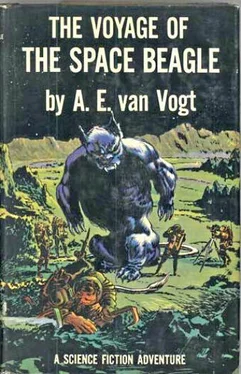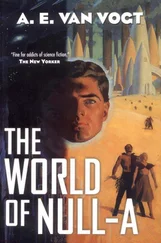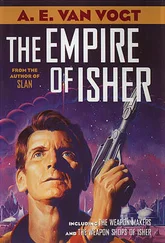He was surprised that he was allowed to complete the hurried analysis. But it seemed clear that he had been accepted as an assistant of the dead Breckenridge. It was a natural error in so big a ship, where men had not yet had time to identify all the lower-rank technicians.
“In the meantime, Director,” Kent said quietly, “we are faced with a super-being in control of the ship, completely dominating the engine room and its almost unlimited power, and in possession of the main section of the machine shops.”
It was a simple statement of the situation. And Grosvenor felt its impact upon the other men. Their anxiety showed on their faces.
A ship’s officer spoke up. “Mr. Kent is wrong,” he said. “The thing doesn’t dominate the engine room completely. We’ve still got the control bridge, and that gives us first control of all the machines. You gentlemen, being supernumeraries, may not know the mechanical set-up we have. Undoubtedly, the creature could eventually disconnect us, but right now we could cut off all the switches in the engine room.” “For God’s sake!” said a man, “why didn’t you just shut off the power instead of putting a thousand men into space suits?”
The officer was precise. “Captain Leeth believes we are safer within the force fields of our space suits. It is probable that the creature has never before been subjected to five or six gravities of acceleration. It would be unwise to give up that and other advantages in panicky moves.”
“What other advantages have we got?”
Morton spoke up. “I can answer that. We know things about him. And right now I’m going to suggest to Captain Leeth that we make a test.” He turned to the officer. “Will you ask the commander to authorize a little experiment I want to make?”
“I think you’d better ask him yourself, sir. You can reach him by communicator. He’s up on the bridge.”
Morton came back in a few minutes. “Pennons,” he said, “since you’re a ship’s officer and head man in the engine room, Captain Leeth wants you to take charge of this test.”
It seemed to Grosvenor that there was a hint of irritation in Morton’s tone. Evidently, the commander of the ship had been in earnest when he had said that he was taking charge. It was the old story of partially divided commands. The dividing line had been defined as precisely as possible, but obviously the authorities could not predict all contingencies. In the final issue, much depended on the personality of the individuals. Until now, the ship’s officers and crew, all military people, had meticulously carried out their ship duties, subordinating themselves to the purpose of the tremendous voyage. Nevertheless, past experience on other ships had proved to the government that for some reason military men did not have a high opinion of scientists. In moments such as this, the hidden hostility showed itself. Actually, there was no reason why Morton should not be in charge of his own experimental attack.
Pennons said, “Director, there isn’t time for you to explain the details to me. You give the orders! If I disagree with any of them, we’ll talk it over.”
It was a graceful surrender of prerogative. But then Pennons, as chief engineer, was a fully-fledged scientific man in his own right.
Morton wasted no time. “Mr. Pennons,” he said crisply, “detail five technicians to each of the four approaches to the engine room. I’m going to lead one group. Kent, you take number two. Smith, number three. And Mr. Pennons, of course, number four .We’ll use mobile heaters and blast through the big doors. They’re all shut, I noticed. He’s locked himself in.
“Selenski, you go up to the control bridge and shut off everything except the drive engines. Gear them to the master switch, and cut them all off at the same time. One thing, though. Leave the acceleration on full blast. No anti-acceleration must be applied to the ship. Understand!”
“Yes, sir!” The pilot saluted, and started along the corridor.
Morton called after him, “Report to me through the communicators if any of the machines start to run again!”
The men selected to assist the leader were all members of the fighting crew. Grosvenor, with several others, waited to watch the action from a distance of about two hundred feet. He felt an empty sense of waiting for disaster as the mobile projectors were brought up and the protective screens arranged. He appreciated the forcefulness and the purpose of the attack that was about to be made. He could even imagine that it might be successful. But it would be a hit-or-miss success, not actually predictable. The affair was being handled on the basis of an old, old system of organizing men and their knowledge. Most irritating was the fact that he could only stand by and be negatively critical.
Morton’s voice came over the general communicator. “As I’ve said, this is largely a test attack. It’s based on the presumption that he hasn’t been in the engine room long enough to do anything. That gives us an opportunity to conquer him now, before he’s had time to prepare against us. But aside from the possibility that we can destroy him immediately, I have a theory. My idea is this: Those doors are built to withstand powerful explosions, and it will take fifteen minutes at least for the heaters to burn them down. During that period, the creature will have no power. Selenski is about to shut it off. The drive, of course, will be on, but that’s atomic explosion. My guess is he can’t touch stuff like that. In a few minutes you’ll see what I mean — I hope.”
His voice went up in pitch as he called, “Ready, Selenski?”
“Ready.”
“Then cut the master switch!”
The corridor — the whole ship, Grosvenor knew — was abruptly plunged into darkness. He clicked on the light of his space suit. One by one, the other men did the same. In the reflections from the beams, their faces looked pale and tense.
“Blast!” Morton’s command was clear and sharp in the communicator.
The mobile units throbbed. The heat that sprayed out of them, though not atomic, was atomic generated. It poured upon the hard metal of the door. Grosvenor could see the first molten drops let go of the metal and begin to flow. Other drops followed until a dozen streams moved reluctantly out of the path of the energy. The transparent screen began to mist, and presently it was harder to see what was happening to the door. And then, through the misted screen, the door began to shine with the light of its own hotness. The fire had a hellish look to it. It sparkled with a gemlike brightness as the heat of the mobile units ate at the metal with slow fury.
Time went by. At last Morton’s voice came, a husky sound. “Selenski!”
“Nothing yet, Director.”
Morton half whispered, “But he must be doing something. He can’t just be waiting in there like a cornered rat, Selenski!”
“Nothing, Director.”
Seven minutes, then ten, then twelve went by.
“Director!” It was Selenski’s voice, taut. “He’s got the electric dynamo running.”
Grosvenor drew a deep breath. And then Kent’s voice sounded on the communicator. “Morton, we can’t get any deeper. Is this what you expected?”
Grosvenor saw Morton peering through the screen at the door. It seemed to him, even from the distance, that the metal was not as white-hot as it had been. The door grew visibly redder, and then faded to a dark, cool colour.
Morton was sighing. “That’s all for now. Leave the crew men to guard each corridor! Keep the heaters in place! Department heads come up to the control bridge!”
The test, Grosvenor realized, was over.
To the guard at the entrance of the control bridge, Grosvenor handed his credentials. The man examined them doubtfully.
Читать дальше











